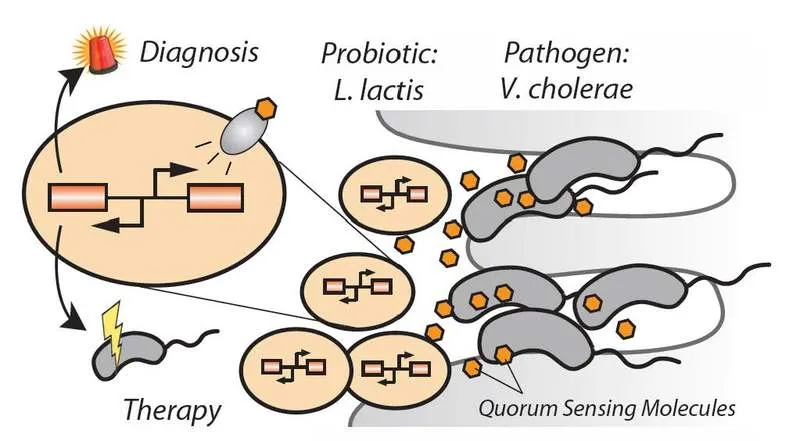Synthetic Hybrid Receptor and Genetic Circuit in Probiotic Bacteria to Detect Enteric Pathogenic Microorganisms
Cholera is an infectious disease caused by the pathogen Vibrio cholerae. It results in severe and potentially fatal symptoms including diarrhea and dehydration. Ingestible, functionalized probiotics that sense and treat cholera can be used in place of conventional antibiotics, which can confer drug resistance and/or deliver unwanted side effects. Additionally, and unlike conventional antibiotics, functionalized probiotics can be administered as a preventative measure to family members of patients and to vulnerable communities during seasonal and regional disease outbreaks.
Researchers
-
synthetic hybrid receptor and genetic circuit in bacteria to detect enteric pathogenic microorganisms
United States of America | Granted | 10,802,021
Figures
Technology
Cholera, caused by pathogen V. cholerae, is a potentially fatal infectious disease. V. cholerae uses quorum sensing to communicate with members of its own species and to coordinate a cell density-dependent behavioral response. V. cholerae secretes and detects the quorum sensing molecule CAI-1. When secreted CAI-1 binds the cell surface receptor CqsS, a phosphorylation signal is transmitted into the cell, resulting in altered transcription. This system provides the means for a gene expression response to the detection of a specific pathogen. A hybrid receptor containing the sensory domain of CqsS enables the FDA-approved probiotic Lactococcus lactis to sense the CAI-1 that is secreted by V. cholerae. The circuit downstream of the hybrid receptor is further engineered such that binding of the receptor results in increased expression of a target gene. This target gene can be a colorimetric output for diagnosis, or a variety of antimicrobial agents such as antimicrobial particles (AMPs) or bacteriophage that can inhibit V. cholerae. This system differs from conventional antibiotics in that it serves to both detect and treat disease. It can be used as a preventative measure, a diagnostic tool, and a powerful treatment option.
Problem Addressed
Cholera is an infectious disease that kills 100,000 to 120,000 people each year, mostly in developing countries. Cholera is prone to explosive seasonal and regional outbreaks and, depending on the strain of V. cholerae, can kill within hours if left untreated. The disease can usually be prevented via access to safe drinking water and sanitation. However, due to a widespread lack of environmental and sanitation infrastructure, cholera remains a global threat to public health. Probiotic bacteria that sense and kill V. cholerae can be used to treat and prevent outbreaks of a variety of strains of cholera in a safe, low-cost, and efficient manner.
Advantages
- L. lactis is recognized as safe by the FDA
- Efficient disease treatment
- Specific diagnosis
- Low cost
- Does not contribute to antibiotic resistance
License this technology
Interested in this technology? Connect with our experienced licensing team to initiate the process.
Sign up for technology updates
Sign up now to receive the latest updates on cutting-edge technologies and innovations.
